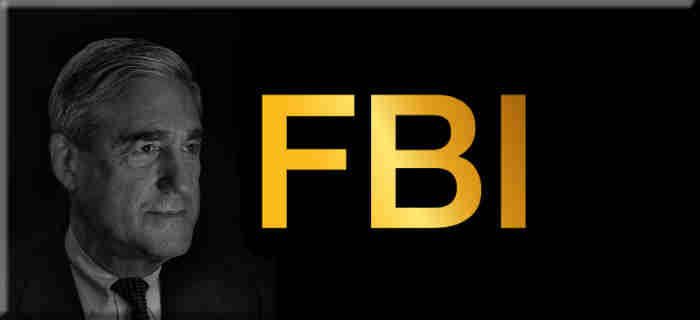By Judi McLeod ——Bio and Archives--September 5, 2018
Cover Story | CFP Comments | Reader Friendly | Subscribe | Email Us
 Did special counsel head honcho Robert Mueller III conclude that pay-dirt could be prised from the President Donald Trump- Russia collusion probe because Russian collusion was already a proven fact of life during his FBI tenure?
It was back in September of 2005 when the FBI arrested the second of two of its own intelligence analysts for computer-based espionage, one of them for leaking FBI-stored intelligence to Russia.
More than passing strange that the names of neither the two arrested FBI spies were ever mentioned during the year-and-a-half long Donald Trump-Russia collusion probe.
Did special counsel head honcho Robert Mueller III conclude that pay-dirt could be prised from the President Donald Trump- Russia collusion probe because Russian collusion was already a proven fact of life during his FBI tenure?
It was back in September of 2005 when the FBI arrested the second of two of its own intelligence analysts for computer-based espionage, one of them for leaking FBI-stored intelligence to Russia.
More than passing strange that the names of neither the two arrested FBI spies were ever mentioned during the year-and-a-half long Donald Trump-Russia collusion probe. “The FBI complaint against Aragoncillo stated that he had emailed to associates in the Philippines more than 100 sensitive intelligence documents that he had downloaded from the FBI's computer-based ACS case management system. (CFP)
“There have, moreover, been U.S. press reports, including a report by ABC, that Aragoncillo spied for the Philippines by downloading classified information from the computer systems of other U.S. agencies. (CFP) “Prior to joining the FBI, Aragoncillo was a U.S. Marine assigned to the Office of Vice President Al Gore, and reportedly used computers in that office to download classified documents from computer systems at the Pentagon and at the CIA.The FBI labeled Aragoncillo the first known case of espionage within the history of the White House. For over thirty-one months, from 1999 to 2001, Aragoncillo was assigned under Vice President Al Gore and then later under Vice President Dick Cheney (Wikipedia)
Support Canada Free Press

“The case of Aragoncillo can be compared to the earlier case of Robert Hanssen. The FBI complaint filed against Hanssen in February 2001 stated that Hanssen had made "extensive use" of the FBI's computer-based case management system to steal U.S. intelligence secrets for the Russians, and that he had also given the Russians a copy of a technical manual on the COINS II (Community On-Line Information System, 2d version), a software system used by various U.S. intelligence agencies to track the intelligence information they produce. A report by the washingtonpost.com in 2001 stated that Hanssen had also stolen U.S. intelligence secrets from the computer systems of other agencies such as the CIA, NSA, the Pentagon, and the White House. (CFP) “In both cases, the spies planted in the FBI had evidently been able to gather information by using the PROMIS-derivative software system underpinning all of these U.S. intelligence community database systems. “Reporting on the recent Filipino spy case, John Diamond of USA Today wrote: "after the Hanssen case, the FBI began a $170 million upgrade of its computer network. “Severe technical problems led to that upgrade having to be be scrapped, and only now is the FBI seeking bids for a new system, called Sentinel. The FBI has serious problems.”(The FBI did adopt the Sentinel program, but because of technological problems, scrapped it, too in 2005-- Wikipedia) The idea of the existence of Russian collusion had to be right under Mueller’s nose as FBI director when two spies were caught working at the bureau. Did Robert Mueller know Russian collusion within the FBI could lend credibility to the existence of Russian collusion when going after President Trump? Hello, Attorney General Jeff Sessions? Are you still there?
View Comments